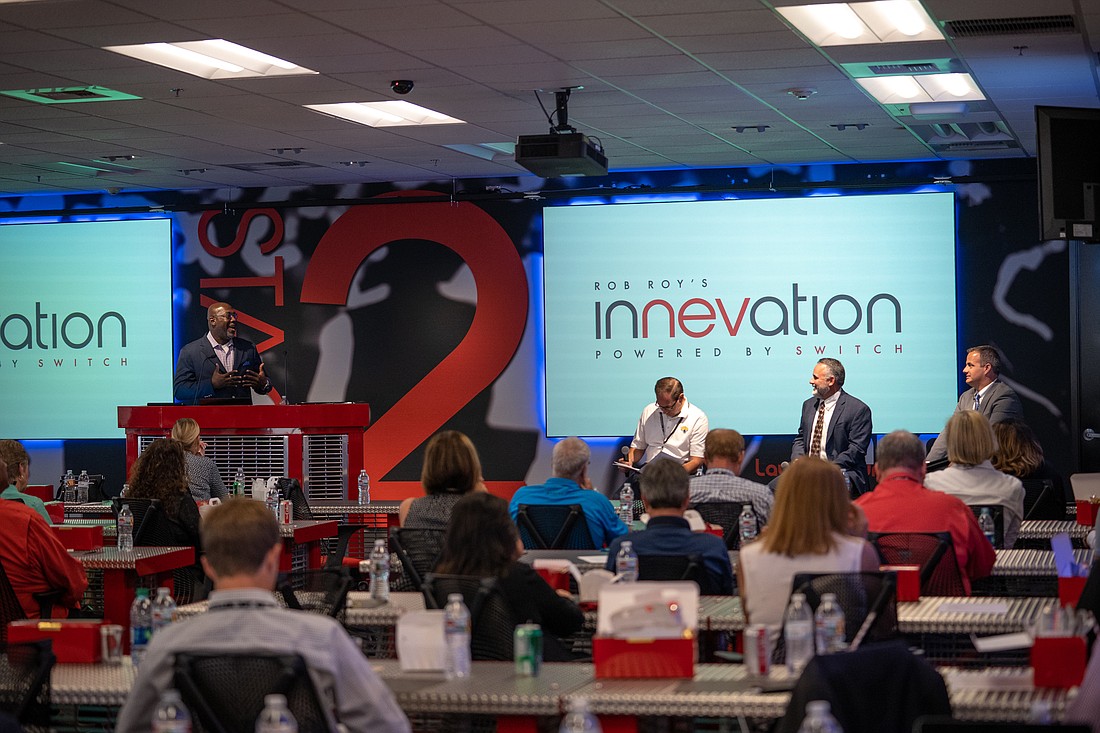
JAX Chamber’s three-day trip to Las Vegas was all about data and automation.
From Sept. 18-20, the 136 members who attended the group’s annual trip to different cities focused on technologies for autonomous vehicle transportation, said chamber President and CEO Daniel Davis.
Leaders wanted to understand how Las Vegas uses one of the largest data centers in the U.S. to improve traffic flow and road safety.
Las Vegas was awarded a $5.3 million BUILD grant in December. It is the same U.S. Department of Transportation program that awarded the Jacksonville Transportation Authority and the city $25 million for the automated vehicle Ultimate Urban Connector project, or U2C.
Las Vegas is using the federal money to add to its Innovation District infrastructure, deploying four autonomous shuttles, 100 connected vehicle onboard units and smart signal and pedestrian detection software at 20 public intersections.
The city established the Innovation District in 2017 and wants to become a “smart city” by 2025.
A public-private partnership with NTT Communications and Dell Technologies led to the purchase and installation of high-definition video cameras, sound and motion sensors and other internet-connected security in public intersections and transit areas.
Las Vegas is using real-time data to improve transportation infrastructure. Davis said in June that he considers Las Vegas a leader when it comes to smart city tech adoption.
Davis compares some of what he saw to the University of North Florida’s Downtown Center for Entrepreneurship and Innovation and the Mayo Clinic’s $32.4 million Discovery and Innovation Building.
That building, which opened Aug. 22, houses Mayo Clinic’s Life Sciences Incubator for biotech entrepreneurs.
“They (Las Vegas) have transportation-related technology and an innovation center close to an innovation coordinator where those companies set up shop,” Davis said.
“They receive venture capital investment and grow companies. We’re already seeing that with the innovation center that Mayo has put in and UNF Downtown.”
Dublin-based autonomous vehicle manufacturer APTIV deployed 30 autonomous vehicles throughout Las Vegas in a partnership with ride-hailing app Lyft. Davis used the APTIV system.
For Jacksonville, he sees JTA’s U2C concept as a more viable option for autonomous transportation, expanding and retrofitting the Skyway mass transit system.
“I think the direction we’re headed is a little more realistic, because it’s going to help move people in Downtown and repurpose the existing Skyway in a looped system,” Davis said.
Bay Street transportation
City Council Finance Committee Chair Aaron Bowman introduced legislation to Council on Aug. 13 to designate a 3-mile stretch of Bay Street from JTA’s Jacksonville Regional Transportation Center under construction in LaVilla to TIAA Bank Field and the Sports Complex as the “Bay Street Innovation Corridor.”
If approved, Ordinance 2019-0556 will direct the city and senior management of JEA and JTA to develop policies for the promotion and adoption of new transportation systems, like the U2C, and communication infrastructures and technologies.
The goal of the corridor declaration is similar to what Las Vegas has in play — an array of sensors that can monitor weather, flooding, pedestrian movements, traffic flow, traffic signals, parking availability and other conditions which “will enhance mobility and livability in the downtown area,” the legislation states.
According to the bill, the innovation corridor will use JEA’s existing dark fiber infrastructure to provide high-speed communication lines to transmit transportation data.
Jacksonville’s public utility owns 650 route miles of fiber with expansion underway.
With JEA leadership exploring privatization or recapitalization of the public utility, it’s unclear if the city or a private company will control the fiber infrastructure as the innovation district comes online.
JEA CEO Aaron Zahn and Chief Customer Officer Kerri Stewart traveled to Las Vegas with the chamber as did regional leaders from Florida-based private utility companies Florida Power & Light Co. and TECO.
TECO Peoples Gas sent Regional Manager Jason Roth. External Affairs Manager Jim Bush represented FPL.
FPL President and CEO Eric Silagy said Aug. 16 the utility was interested in placing a bid for JEA.
Attendees by the numbers
Of the chamber members on the Las Vegas trip, 10 were city government officials — council members; staff; and JTA and JEA senior management.
For-profit companies paid $3,600 per person. Government and nonprofit representatives were charged $3,500.
Council was represented by President Scott Wilson and District 5 member LeAnna Cumber.
Bowman registered as a representative of JAXUSA Partnership, where he’s senior vice president of business development, and Council member Rory Diamond attended as the CEO of K9s for Warriors. JAXUSA is the economic development division of JAX Chamber.
City Deputy Chief Administrative Officer Stephanie Burch and Kirk Wendland, executive director of the Office of Economic Development, also attended.
From the city’s independent authorities, Zahn and Stewart were joined by JTA CEO Nat Ford and Government Affairs Director Jessica Shepler.